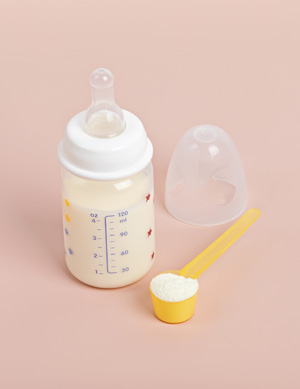Free Case Evaluation
You will never be charged a fee unless a recovery is made for you.
We are no longer accepting new cases.
We are also accepting related cases of premature babies who developed necrotizing enterocolitis (NEC) after being fed Enfamil® or Similac formula or fortifier.
Abbott Nutrition has recalled certain lots of Similac, Similac PM 60/40, Alimentum, and EleCare powdered infant formula because of possible Cronobacter contamination. To date, five infants have been diagnosed with Cronobacter, a bacterial infection, and two infants have died. There has also been one reported case of Salmonella in an infant fed the recalled formula. These instances occurred in Minnesota, Ohio, and Texas between September 16, 2021, and January 4, 2022. And new instances of illness are already being reported.
The recalled infant formulas were all produced at Abbott’s plant in Sturgis, Michigan. To see if a particular container has been recalled, click here to access the Abbott website to input the lot number from the container.

Per the CDC, parents and caregivers of infants and babies should not feed their baby recalled Similac, Similac PM 60/40, Alimentum, or EleCare powdered infant formulas.
If you or a loved one have a baby who was fed recalled Similac, Similac PM 60/40, Alimentum, and EleCare powdered infant formula and required medical treatment as a result, and you are considering a baby formula lawsuit, call us at 800-796-1636 or submit your case details online. Someone will contact you shortly. You pay nothing unless your lawsuit is successful and you receive compensation.
At Trustwell Law, our experienced attorneys take a personalized, compassionate approach. We cut through the legalese and partner with our clients. We have access to the expertise, resources, and manpower to fully investigate each case and fight for and with our clients to get the justice they deserve.
Cronobacter is a bacterium that can cause severe, life-threatening infections (sepsis) or meningitis, which is inflammation of the membranes that protect the brain and spine. Cronobacter infections are rare, but they are particularly high risk for newborns.
Salmonella are a group of bacteria that can cause gastrointestinal (stomach) illness and a fever called salmonellosis.
Symptoms of Cronobacter and Salmonella infection may include:
If your baby has eaten any of the recalled formulas and they have any of these symptoms, contact your health provider immediately or go to the emergency room.
FDA inspectors reportedly found that Abbott didn’t maintain clean surfaces in the areas used for producing and handling powdered formula at its Sturgis, Michigan plant. These conditions were noted in September 2021, five months before Abbott conducted the recall of Similac, Similac PM 60/40, Alimentum, and EleCare powdered infant formula. Also, on the same September day the FDA began its inspection, Minnesota health officials reportedly told the agency about an infant who had become ill with a Cronobacter bacterial infection after eating the formula.
It has also been reported that, in their report, FDA inspectors noted a history of Cronobacter contamination at the plant, including eight separate occurrences between fall 2019 and February 2022.
FDA Form 483 is an official document titled “Inspectional Observations.” The agency issues them to company management after an FDA inspection at which the inspectors noticed “objectionable” conditions. The Forms 483 from FDA inspections at the Abbott plant in Sturgis, Michigan in 2019, 2021, and 2022 all reported problems.
The FDA reports, released following Freedom of Information Act requests, indicate that the FDA had long been concerned about potential safety issues at the Abbott plant. The findings in the inspection reports include:
The FDA has posted these links for Parents
And remember, to check if a container has been recalled, click here to access the Abbott website to input the lot number from the container.
If your baby was fed recalled Similac, Similac PM 60/40, Alimentum, and EleCare powdered infant formula and required medical treatment, you may be entitled to compensation.
Contact us for a free consultation.
Sources
Abbot. (2022, February 17 and 28). Recall Notice: U.S. / Puerto Rico. Retrieved from https://www.similacrecall.com/us/en/home.html?gclid=Cj0KCQiA64GRBhCZARIsAHOLriKqzAjcueK2HXEzzt4L5_R2PcHSRagzsFqFiZhP8d0dlFRq6NzPtFQaAnhFEALw_wcB&gclsrc=aw.ds
Abbot. (nd). Check lot number. Retrieved from https://www.similacrecall.com/us/en/product-lookup.html
Battiste, N. (2022, March 2). At least eight additional babies sickened by recalled formula, lawyer says. Retrieved from https://www.cbsnews.com/news/powdered-baby-formula-recall-similac-fda/
Burke, M. (2022, March 2). Baby formula recall following infant deaths spotlights rare but dangerous bacterial infection. Retrieved from https://www.nbcnews.com/health/health-news/baby-formula-recall-spotlights-rare-dangerous-cronobacter-sakazakii-rcna18139
Centers for Disease Control and Prevention. (2022, March 1). Cronobacter: ALERT: Cronobacter Illnesses Linked to Powdered Infant Formula. Retrieved from https://www.cdc.gov/cronobacter/infection-and-infants.html
Jones, G. C. (2022, March 2). More Abbott baby formula recalled after reports of illnesses. Retrieved from https://www.cbsnews.com/news/baby-formula-recall-similac-abbott/
Tyko, K. (2022, March 1). Baby formula recall expands to include Similac PM after another baby dies of Cronobacter. Retrieved from https://www.usatoday.com/story/money/food/2022/02/28/similac-recall-2022-baby-formula/9323886002/
U.S. Food and Drug Administration. (2022, February 17). FDA Warns Consumers Not to Use Certain Powdered Infant Formula Produced in Abbott Nutrition’s Facility in Sturgis, Michigan. Retrieved from https://www.fda.gov/news-events/press-announcements/fda-warns-consumers-not-use-certain-powdered-infant-formula-produced-abbott-nutritions-facility
U.S. Food and Drug Administration. (2022, February 28). Infant Formula Recall: What to Know. Retrieved from https://www.fda.gov/consumers/infant-formula-recall-what-know
U.S. Food and Drug Administration. (2022, February 28). FDA Investigation of Cronobacter and Salmonella Complaints: Powdered Infant Formula (February 2022). Retrieved from https://www.fda.gov/food/outbreaks-foodborne-illness/fda-investigation-cronobacter-and-salmonella-complaints-powdered-infant-formula-february-2022
You will never be charged a fee unless a recovery is made for you.